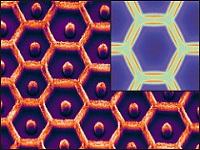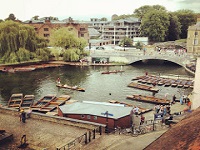Knowledge Transfer Fellowships
Please note: we are not currently accepting application for Knowledge Transfer Fellowships. We expect to launch new calls for IAA Impact Starter Grants, Follow-on Fund projects, and Knowledge Transfer Fellowships in late 2021 or early 2022, for projects to start from 1st April 2022 onwards. Guidance for this scheme will remain as below
Knowledge Transfer Fellowships aim to transfer knowledge and expertise linked to EPSRC research between the University and a partner company. The Fellowship funds a researcher or member of academic staff to undertake a 3-12 month secondment to a business or other partner organisation. Fellowships are also open to company employees to spend time working in a University department to facilitate knowledge transfer.
The exchange of people between industry and academia creates a two-way flow of knowledge and expertise, allowing both partners to benefit from new perspectives and insights. Researchers can gain great career benefit from spending time in industry to understand the different needs and culture of commercial organisations, making useful links and contacts for the future. Potential applicants are advised to consult the Secondments – Lessons from Practice guide.
Who can apply
Outward Fellowships: Academic staff, postdoctoral research staff and completing PhD students can be considered for a Fellowship. Fellowship applications are particularly welcomed from completing PhD students and post-doctoral researchers to transfer the results of their research into a partner company or other organisation. PhD students/PDRAs are recommended to consult their supervisor as the first step in applying for a Fellowship. PhD students must have submitted their thesis before commencing the Fellowship. Collaborations or fellowships with companies in which the Principal Investigator / Knowledge Transfer Fellow is involved in any way (eg ownership, science board membership, etc.) are ineligible for IAA funding.
Inward Fellowships: Applications are invited from academic staff to host a named industry contact in their Department for a 3-12 month Fellowship. Applicants need not personally have been previously funded by an EPSRC grant or studentship. However the field of work must fall within EPSRC remit and the proposal must demonstrate how knowledge and expertise linked to EPSRC research will be transferred between the University and the partner company.
Eligible Costs
Outward Fellowships: Staff costs (full- or part-time) for the Fellow plus travel and subsistence can be included up to a maximum of £70,000. As a result of the global COVID19 pandemic, we recognise that secondments to industry may be impacted by the adoption of remote working arrangements policies for company staff. In this context, we can accept applications for Knowledge Transfer Fellowships which include an element of remote working. The proportion of time to be spent working remotely must be made clear in the workplan in section 3.3 of the application form. The workplan must also explain what other measures will be taken to ensure effective knowledge transfer. The company letter of support must explain why full-time physical hosting is not possible.
Inward Fellowships: Travel and subsistence, consumables, and other direct costs can be supported up to a maximum of £70,000. N.B. IAA funds cannot be used for employment costs of the incoming Fellow as they will continue to be employed by their existing employer.
In all cases funds cannot be used for patent costs, estates costs, indirect costs or capital items of equipment. Full Economic Costing (fEC) must be used when completing the form. Please consult with your departmental finance team to obtain an X5 costing for your proposal. Projects should be completed within 18 months of the award date.
Application process
Potential applicants are encouraged to contact their departmental Knowledge Transfer Facilitator (KTF) for advice. If your department does not have a Knowledge Transfer Facilitator, please contact researchstrategy@admin.cam.ac.uk with any queries.
Applicants must ensure they are aware of any internal Departmental deadlines for approval by Head of Department before submission.
Proposals must be submitted on the IAA form, together with a letter of support from the company partner, confirming agreed details of the secondment of staff on a full- or part-time basis as appropriate.
Proposals should be emailed to researchstrategy@admin.cam.ac.uk by midnight on the closing date.
Expressions of interest are not required.
Assessment process
Funding will be awarded on a competitive basis. Applications will be considered by a cross-disciplinary panel of academics with experience in industrial collaboration.
Applications will be considered against the following criteria:
- Quality of project plan;
- Track record/relevance of partners;
- Commitment and contribution of company partner;
- Potential benefits to all partners
Post-award guidance
An appropriate collaboration agreement covering IP terms between the University and company must be signed. Please contact the Research Operations Office for advice.
As a matter of good practice, any changes to project timescales or scope should be by prior agreement with the company partner.
As a condition of the grant, progress review meetings must be held at the start of the project and then at least every 3 months with your Departmental Knowledge Transfer Facilitator, or equivalent, to monitor project progress and identify any additional support needs.
A written final report will be required within 2 months of the end of the project.
Any questions regarding the scheme arrangements should be directed to researchstrategy@admin.cam.ac.uk.
EPSRC IAA Knowledge Transfer Fellowships Case Studies
|
Dr Judith Rommel (Knowledge Transfer Fellow) Professor David Wales (Principal Investigator) From consultancy and industry contacts to more powerful materials modelling software, this EPSRC Knowledge Transfer Fellowship between the Department of Chemistry and BIOVIA has brought benefits to both - and revealed some fascinating cultural differences between industry and academia. Read more about Judith's project here. |
|
|
Dr Jamie Anderson (Knowledge Transfer Fellow) Professor Koen Steemers (Principal Investigator) Human health and wellbeing are shaped by our built environment, but building the latest architectural research into urban development is challenging. Thanks to an EPSRC IAA Knowledge Transfer Fellowship, health and wellbeing is now a strategic priority of the Department of Architecture, as well as an expanding area of work for industry partner BuroHappold. Read more about Jamie's project here. |


